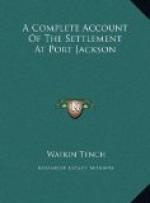Bereewan seemed to be a man about thirty years old, differing in no respect from his countrymen with whom we were acquainted. He came to us unarmed, having left his spears at a little distance. After a long conversation with his countrymen, and having received some provisions, he departed highly satisfied.
Tuesday, April 12th, 1791. Started this morning at half past six o’clock, and in two hours reached the river. The whole of the country we passed was poor, and the soil within a mile of the river changed to a coarse deep sand, which I have invariably found to compose its banks in every part without exception that I ever saw. The stream at this place is about 350 feet wide; the water pure and excellent to the taste. The banks are about twenty feet high and covered with trees, many of which had been evidently bent by the force of the current in the direction which it runs, and some of them contained rubbish and drift wood in their branches at least forty-five feet above the level of the stream. We saw many ducks, and killed one, which Colbee swam for. No new production among the shrubs growing here was found. We were acquainted with them all. Our natives had evidently never seen this river before. They stared at it with surprise, and talked to each other. Their total ignorance of the country, and of the direction in which they had walked, appeared when they were asked which way Rose Hill lay; for they pointed almost oppositely to it. Of our compass they had taken early notice, and had talked much to each other about it. They comprehended its use, and called it ‘naamoro,’ literally, “to see the way”; a more significant or expressive term cannot be found.
Supposing ourselves to be higher on the stream than Richmond Hill, we agreed to trace downward, or to the right hand. In tracing, we kept as close to the bank of the river as the innumerable impediments to walking which grow upon it would allow. We found the country low and swampy; came to a native fireplace, at which were some small fish-bones; soon after we saw a native, but he ran away immediately. Having walked nearly three miles we were stopped by a creek which we could neither ford, or fall a tree across. We were therefore obliged to coast it, in hope to find a passing place or to reach its head. At four o’clock we halted for the night on the bank of the creek. Our natives continued to hold out stoutly. The hindrances to walking by the river side which plagued and entangled us so much, seemed not to be heeded by them, and they wound through them with case; but to us they were intolerably tiresome. Our perplexities afforded them an inexhaustible fund of merriment and derision: Did the sufferer, stung at once with nettles and ridicule, and shaken nigh to death by his fall, use any angry expression to them, they retorted in a moment, by calling him by every opprobrious name* which their language affords.




